
Corona-phobia
All in this together, or in danger of turning on each other?
June 2019
Comment
Hate speech isn’t freedom of speech

In the United States in March, Democrat presidential hopeful Elizabeth Warren, a highly regarded policy buff, published a detailed plan calling for the forced break-up of tech companies such as Google, Amazon and Facebook.
“Today’s big tech companies have too much power – too much power over our economy, our society, and our democracy,” Warren wrote. Her policy proposal forced onto the national, and international, agenda a discussion that was previously only bubbling away in academic and niche spheres.
A week after Warren’s intervention, a 28-year-old Australian man wielding an assault rifle walked into two mosques in Christchurch and slaughtered 51 worshippers. The entire ordeal was live-streamed on Facebook for a full 17 minutes.
Despite Facebook eventually taking the video down from the shooter’s page, it was re-uploaded approximately 1.5 million times. Facebook claimed it had acted as quickly as it possibly could, but tech experts criticised the delay, which allowed the video to spread, pointing out that Facebook is extremely efficient at preventing the distribution of violent jihadi material and Daesh propaganda.
Two weeks after the Christchurch massacre, Mark Zuckerberg, co-founder and chief executive of Facebook, wrote a comment piece for The Washington Post in which he called for greater regulation of his company’s activities, arguing that society needed to be protected from hate speech and terrorist propaganda.
“Lawmakers often tell me we have too much power over speech, and frankly I agree,” he said. “Internet companies should be accountable for enforcing standards on harmful content.”
Ten days after Zuckerberg’s extraordinary intervention, in which he implored governments to take responsibility of policing hate speech away from tech entrepreneurs, Chris Hughes, his old college roommate and a co-founder of Facebook, synthesised his and Warren’s proposals. In Hughes’s push for reform, published in The New York Times, he called for Facebook to be broken up along the lines of Warren’s recommendation, and for greater policing of speech on social media as per Zuckerberg’s piece.
“The most problematic aspect of Facebook’s power is Mark’s unilateral control over speech,” Hughes said. He also made the point that Facebook already monitored and controlled what billions of people saw. But this was done through opaque processes implemented by underpaid and undertrained moderators tasked with making complex decisions about what was hate speech, what was terrorist propaganda, what was art and what was pornography, et cetera.
Since Hughes’s remarks, Facebook, Google and Twitter have signed up to the Christchurch Call – a project initiated by New Zealand’s prime minister, Jacinda Ardern, to limit the dissemination of violent and terrorist material online. But this is low-hanging fruit, and doesn’t offer much when it comes to the thornier issue of hate speech.
The perspectives offered by Warren, Zuckerberg and Hughes might not align perfectly, but there is now no doubt that some of the world’s most powerful and influential political and tech figures are seriously discussing major reform when it comes to online speech. The debate has zeroed in on the tension between protecting free speech and enabling hate speech, and the balance of power between government and private tech companies.
In Australia, the free-speech debate isn’t about bold attempts to reshape the online sphere. And it isn’t about what role governments and tech companies should play in preventing the proliferation of hate speech and terrorist propaganda. While New Zealand and Germany have enacted laws that specifically govern conduct and speech online, and regulators in the United Kingdom and France have proposed a raft of new laws to govern online hate speech, we aren’t even debating these ideas.
I found out the hard way just how lacklustre are Australia’s laws around online speech. After being subjected to a barrage of violent, racist abuse – including death threats – I researched the legal framework around online hate speech for the ABC’s investigative documentary program Background Briefing. I was surprised and disturbed to learn that the one law that’s supposed to capture offensive and intimidating conduct online was written in 2004, before Facebook had launched in Australia and before Twitter even existed. I also discovered that police often don’t even know about the law’s existence – or are unwilling to enforce it.
Our free-speech debate has been about a rugby union player’s right to vilify the LGBTI community without consequence. And it perfectly encapsulates the hypocrisy, shallowness and intellectual paucity that has come to define public discourse in this country.
You don’t even have to cast judgement on the content of Israel Folau’s post (which claimed hell awaited homosexuals) or the punishment meted out by Rugby Australia (the termination of Folau’s contract) to grasp the obvious lack of depth on display from Australian politicians and sections of the media.
When it comes to the tricky nexus of freedom of speech, the proliferation of hate speech and social media, this became our highest profile case. Not Christchurch, not the explosion of far-right activism online in recent years, but Israel Folau. It was elevated to a federal election issue, with prominent Christian organisations using it as a proxy for broader debates about religious freedom. Both the prime minister and Opposition leader were asked about Folau during the third and final leader’s debate.
High-profile commentators associated with News Corp have been doing their best to make sure we keep talking about the rugby player and the apparent injustice he’s facing. The same media outlets that have hounded individuals like Yassmin Abdel-Magied and yours truly for allegedly posting “offensive” comments on social media have campaigned for Folau’s right not only to demonise the LGBTI community but also to do so while representing Australia.
“All he has done is quote the Bible and you seem to think that it’s okay to destroy not just his job, but his livelihood,” Miranda Devine said in Folau’s defence. Devine was seemingly oblivious to the attempts by her employer, News Corp, to destroy the careers and livelihoods of countless others for lesser offences.
The situation betrays a depressing but obvious truth. The only free speech the most vocal conservatives in this country care about is their right to vilify marginalised groups on the basis of their race, religion or sexuality. The past decade of political debate in this area, kickstarted by Andrew Bolt’s now famous loss in a racial vilification court case, has demonstrated this beyond doubt.
In fact, it’s frequently the self-styled defenders of free speech who reveal themselves as the most vocal agitators for it to be stripped away. Oh, but we don’t want people like Abdel-Magied to be prevented from speaking, they claim. Instead, they just want them fired, their platforms removed, the online spaces they exist in to be made hostile.
They reverse such arguments when it comes to Folau. In defence of his free speech, they don’t think he should suffer consequences regarding his employment or lucrative sponsorship deals. After all, these are his personally held religious views.
So what does the hypocrisy around the free-speech debate have to do with Facebook, hate speech and the regulation of online spaces? It’s that while the Australian debate about speech has been almost exclusively focused on, to quote our former attorney-general, the “right to be bigots”, something else has been going on that hasn’t been interrogated anywhere near enough.
Emboldened by political success overseas and egged on by some local politicians and News Corp, the far right have unleashed a wave of vitriol and threats both online and in the real world. They’ve been able to organise, mobilise and take action in public almost completely unchecked. Rather than apply scrutiny, powerful sections of our media have instead chosen to promulgate their views.
And it’s online in public spaces such as Facebook and Twitter where members of the far right flourish. During the same period when some Australian politicians and media identities waged hate campaigns against prominent Muslims, the far right networked, spread propaganda and unleashed campaigns of intimidation and threats of violence. They have been the main beneficiaries of our lopsided “debate” on freedom of speech. While other countries have passed legislation aimed at cracking down on hate speech online, we’ve been trapped in a never-ending discussion about the abolition of our only federal hate-speech law, commonly known as section 18C.
Over the course of the federal election campaign, which was preceded by the deadliest mass shooting ever perpetrated by an Australian since colonisation, reams were written about Folau’s free speech, while only a handful of stories about the Christchurch shooting aftermath and the rise of the far right in Australia made their way into print.
In an ideal world it might be possible to have rigorous, intellectual debates about the importance of free speech in a diverse, public domain while also recognising the need to protect citizens from harm – especially from neo-Nazis and other far-right activists. But this isn’t an ideal world; this is Australia. And so we have neither.
As hard as it might be to accept, the case of the Christchurch shooter provides the perfect evidence of that. Even though he was born and raised in this country, there were attempts to disavow any Australian connection to him. Speaking at a memorial in Christchurch, Prime Minister Scott Morrison declared that “extremist terrorists have no nationality”.
Except this one did: he was Australian. And he was inculcated in Australia’s far-right culture. Despite no less than the national security editor of Australia’s only national broadsheet declaring that the shooter’s ideology had nothing to do with Australia, we know that is sadly not the case.
Thanks to investigative reporting by the ABC, we know that the shooter was an active member of the Facebook group of one of Australia’s biggest far-right groups, the United Patriots Front. We also know he donated financially to the organisation. We also know he watched UPF leader Blair Cottrell on national television and enthused about his appearance online. We know that he sent a death threat online to an ideological opponent of the UPF (who claimed that police advised him to just block the shooter on social media and did not take an official statement). We know that he frequented white-supremacist online discussion boards. And we know that he posted on Facebook a specific threat targeting the Al Noor mosque. Two days after that post, he walked into the mosque and began his slaughter.
He did all this at a time when Australia’s government and News Corp were more focused on abolishing hate-speech laws than they were on policing the far-right online. He did it during a time when Australian police agencies were cutting back on their resourcing of hate-crime units, and political parties across Australia were preselecting candidates with far-right leanings.
Could the horror of Christchurch have been prevented if we’d paid more attention to monitoring hate speech and enforcing laws against hate crime? We’ll never know.
Would Australia be a safer and more harmonious place if more time, thought and energy went into developing a robust response to online hate speech and the policing of those promoting violence, instead of a phoney free-speech debate that sees News Corp try to destroy the lives of those it opposes? Undoubtedly.
In the aftermath of Christchurch I had a brief flash of optimism. Having seen the far right grow more emboldened in Australia, having seen them enter parliament and become normalised as part of our political and media elite, I thought the shock of this event may have provided an opportunity to reset.
I was naive.
News Corp wasted little time turning its sights back onto journalists and commentators who called for change after Christchurch, such as Waleed Aly and myself. Aside from a knee-jerk and extremely narrow parliamentary response focused solely on the sharing of violent material online, our political parties have been unwilling to debate bigger changes to the way social media and speech are governed.
Andrew Bolt losing a court case over a column where he denigrated Indigenous Australians led to then opposition leader Tony Abbott promising reform to section 18C in the lead-up to winning the 2013 election. What followed was a four-year process of inquiries, and the demonisation of the Australian Human Rights Commission and its Race Discrimination Commissioner, Tim Soutphommasane.
And following the worst mass shooting by an Australian in modern history? Crickets.
If even the founders of Facebook, whose success is built on the rapid dissemination of speech, can understand the immediate need for its regulation and even restriction, surely Australia’s politicians and journalists can too.

Corona-phobia
All in this together, or in danger of turning on each other?
Northern exposure
COVID-19 is turning Indigenous communities into a tinderbox
Three disasters, a wedding and a funeral
Reckoning with family in times of drought, fire and flood
Viral injustice
Julian Assange’s extradition trial continues as an attack on journalism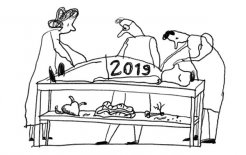
2019 election: The shock of the new normal
Why Morrison’s victory shouldn’t have surprised the major parties
Seoul trained: K-pop and Blackpink
Trying to find meaning in the carefully formulated culture of K-pop
‘Animalia’ by Jean-Baptiste Del Amo
The French author delivers a pastoral that turns on human cruelty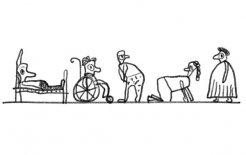
Aged care in crisis
Stories of neglect and abuse from the royal commission
A month of plague
Voices from the coronavirus outbreak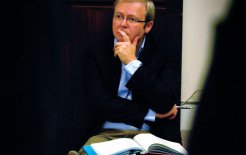
Descent from the summit
Looking back on Kevin Rudd’s overly ambitious and thinly detailed Australia 2020 Summit
Leaders and dung beetles
On John Cain, Scott Morrison and our curious inability to elect good people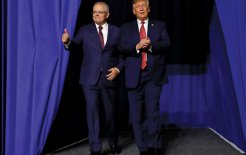
The middle of nowhere
Australia’s political leaders have lost their bearings in a changed world
Northern exposure
COVID-19 is turning Indigenous communities into a tinderbox
Viral injustice
Julian Assange’s extradition trial continues as an attack on journalism
Wage fright
COVID-19 isolation rules have seen artists’ livelihoods disappear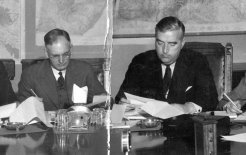
Opposing forces
Even during a time of crisis, history shows that partisan politics has a role to play
Comments